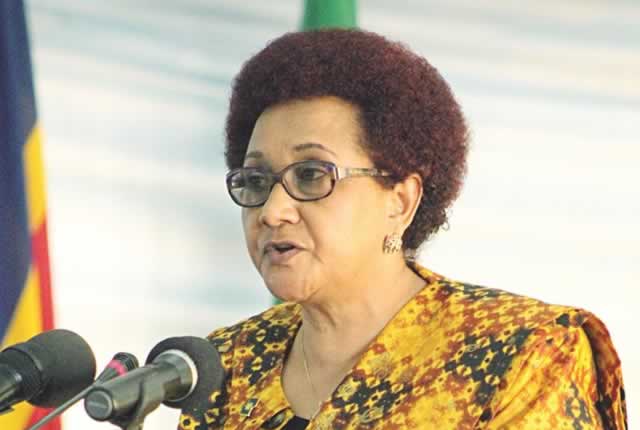Africa urged to have internal treaties

Prosper Ndlovu Business Editor
AFRICA should hasten the implementation of intra-regional trade treaties to create markets for a sound industrial base, thus leveraging the continent’s economy and creating more jobs, Sadc executive secretary Dr Stergomena Tax has said.
Developing a strategy for industrial transformation is at the heart of the regional socio-economic integration agenda adopted by heads of state and governments during the 34th Sadc Summit in Victoria Falls in August this year.
Dr Tax told delegates during an investment meeting in Johannesburg, South Africa, on Tuesday that no country or region can develop without an industrial base supported by the needed infrastructure and a sound market.
While industrialisation, trade and economic growth were closely linked, she said, it was disheartening that intra-regional trade remained low.
“Statistics show that intra-regional trade in Africa rates among the lowest with less than 20 percent of what is produced in Africa traded within Africa. Essentially what this means is that more than 80 percent of Africa’s products are traded outside Africa, mainly to Europe, China and the US,” she said.
“By comparison 60 percent of Europe’s trade is within that region, while in North America 40 percent of trade is within. In the Sadc region, even though we launched the Free Trade Area in 2008 to benefit members by a tariff free trade for all goods originating within the region, the volumes of intra-trade are still very low.”
Dr Tax said urged increased linkages, diversification and quick adoption of product beneficiation and value addition as critical tools towards reversing de-industrialisation and consolidating the gains made in the manufacturing sector over the last decade.
She said the continued dependence on agricultural, raw mineral and other natural resource-based commodity production and exports was not sustainable as it earns the continent little income and cannot help eradicate poverty.
Dr Tax made reference to Malaysia, a country that transformed itself from a predominantly agriculture and natural resource economy to a more industrialised economy, and then a further transformation in the latter part of the 1990s towards a knowledge-based economy. Deliberate strategic interventions aimed at transforming the structure of the economy, she said, was the driver of change that has led to the success of global economies.
The August Sadc summit gave the nod to beneficiation and value addition as the panacea for economic transformation and tasked ministers of industry to fine-tune the industrialisation strategy into implementable propositions.
“Our industrialisation strategy must therefore, in all essence, take into account regional and global value chains for there’s no doubt that Africa’s growing markets will for a long time be the driver of growth,” said Dr Tax.
“Successful development of value chains requires a good balance between trade and industrialisation.”
Dr Tax said prioritised beneficiation should start at micro, small and medium scale industries which are aligned to the continent’s natural resources.
She said such an approach tied to investments in infrastructure development should also be anchored on modern technological trends and supported by scientific research.
‘‘Sadc will continue to pay attention to the relationship between trade and industrialisation as well as linkages between trade and infrastructure development, peace and security . . . and questions of inclusion,’’ she added.
Dr Tax’s remarks come at a time when negotiations are underway to deepen regional integration through establishment of the EAC-Comesa-Sadc Free Trade Area to be launched in 2015.
The platform has since identified border posts refurbishment as an important initiative to improve infrastructure and increase intra-regional trade under the tripartite framework towards enhanced connectivity among the three regional economic blocs.
The three regional groupings are spearheading the one-stop border post system as a means of facilitating faster and smooth movement of goods and people and in turn boost trade.
The Chirundu one-stop border post set up in 2009 is one example while similar border posts under negotiations and construction include those between Malawi and Tanzania at the Tunduma-Nakonde, as well as between Namibia and Angola at the Oshikango-Santa Clara entry points.
The success of these initiatives is expected to boost contributions by small to medium enterprises and informal cross border traders, create opportunities for the youth and women thereby helping to alleviate poverty.
Countries like Zimbabwe whose companies are suffering from low domestic demand stand to benefit immensely from the arrangement.
The move would also provide a solution to concerns that trade liberalisation has undermined the continent’s industrial capacity as cheap products from elsewhere crowd out Africa’s manufacturing sector.
Improved infrastructure development in the region is expected to enhance the ease of doing business, cutting costs and enhancing African market competitiveness.










Comments